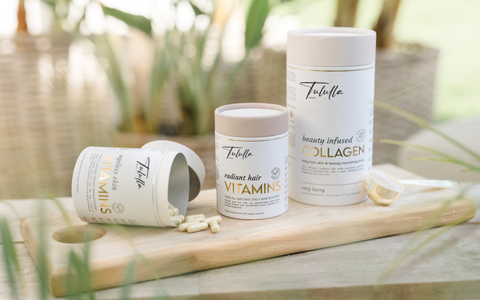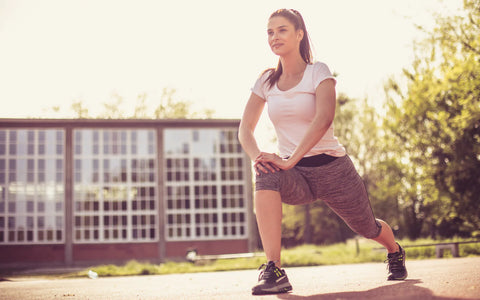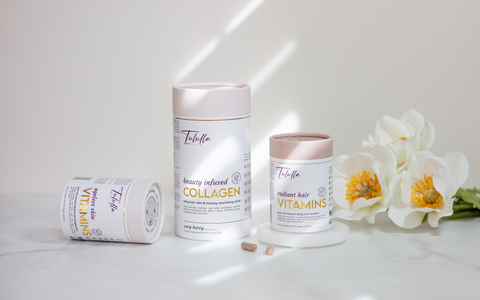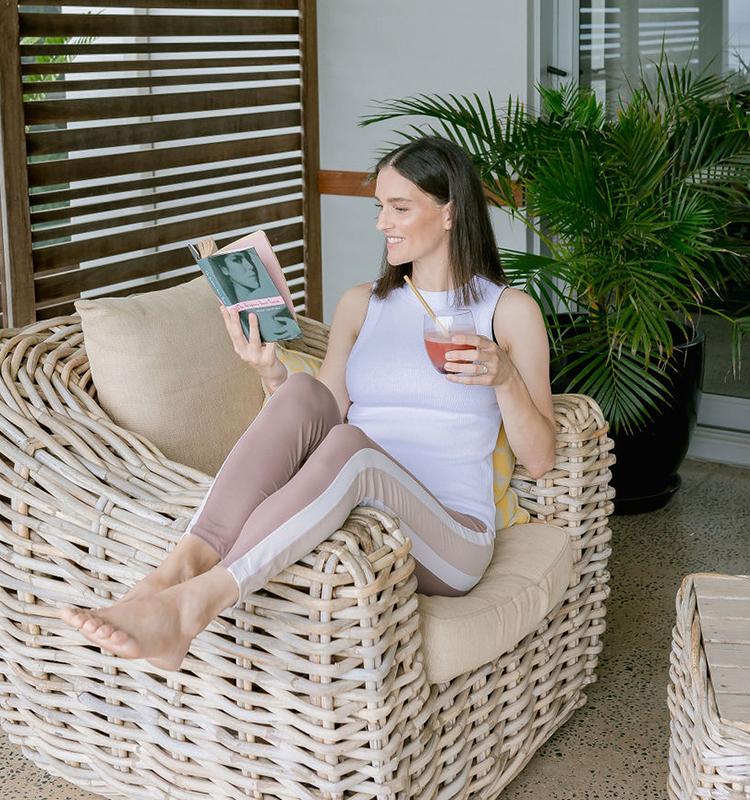While we all want the secret to that eternal “fountain of youth”, the truth is that there’s no shortcut to magically make you appear younger. Botox, for instance, doesn’t actually erase wrinkles or repair your skin from within, it only offers a temporary, and rather expensive solution that needs to be repeated!
Ageing well goes hand in hand with daily habits and practices that are actually pretty simple but have proven long-term benefits.
As the famous saying by Aristotle goes, "We are what we repeatedly do. Excellence, then, is not an act but a habit."
So which anti-ageing habits will truly make a difference to how you look and feel every day? Here are eight scientifically proven habits you can incorporate into your routine, starting now.

1 Take your skincare to the next level
Achieving great skin is about more than just using a daily cleanser or SPF (although both are important in a good skincare routine). But to truly make a difference in how your skin ages, you need to go a little deeper and repair your skin from within – where it matters most.
As the most abundant protein in the body, collagen is crucial for good skin and has plenty of long-term benefits.
In a thorough review of 19 studies that included a total of 1,125 participants, researchers found that those who took collagen supplements experienced remarkable changes in their skin – it became firmer, more supple, and better hydrated, leading to a reduction in the visibility of wrinkles.
Yet, there's a catch: it's not crystal clear whether these fantastic skin improvements were solely thanks to collagen. Most of the trials used supplements that included a variety of anti-ageing ingredients like vitamins, minerals, antioxidants, coenzyme Q10, and hyaluronic acid. This is great news for you, because both our beauty infused COLLAGEN and ageless skin VITAMINS contain all those ingredients and more (like resveratrol, quercetin, vitamin C and pomegranate extract) which all work together to enhance your skin’s complexion, no matter what your age.
2 Think positively
Decade-long research shows that a positive attitude, not just in general, but specifically to the idea of getting older, can lead to a longer, healthier life, while negative beliefs can have hugely detrimental effects.
By following 4,765 participants for four years, a recent study made a heartening discovery: Embracing positive expectations about ageing slashed the risk of developing dementia by half when compared to those who envisioned old age as a period of unavoidable decline.
Here are four more ways in which positive thinking helps to slow down ageing:
- Happy thoughts can reduce stress, which is known to accelerate the ageing process.
- A positive mindset can lead to increased happiness and life satisfaction.
- Studies show that maintaining a positive mindset is associated with better physical health. It's linked to lower blood pressure, reduced heart disease risk, a healthier weight, improved blood sugar levels, and increased lifespan.
- Being happy can lead to healthier lifestyle choices, such as regular exercise and a balanced diet.
- Positive thinking can enhance cognitive resilience, making it easier to adapt to age-related changes and challenges.
- A positive attitude can help you maintain mental agility and a sharp mind as you grow older.
3 Move your body

Regular exercise holds the key to looking and feeling your best throughout your life. Afterall, we’re made to move! First and foremost, physical activity boosts cardiovascular health, reducing the risk of heart disease, stroke, and high blood pressure. This not only adds more years to your life but ensures you enjoy those years with greater vitality. Exercise also plays a crucial role in maintaining a healthy weight, reducing the risk of obesity and related conditions like diabetes, which can extend your lifespan and help you look and feel better.
Additionally, exercise improves muscle tone and bone density, contributing to a more youthful appearance and enhanced physical strength. It enhances your metabolism, making it easier to maintain a healthy weight and over time, it helps to boost energy levels too. Another major benefit of regular movement is how just 10 – 20 minutes of activity helps to release of endorphins that can enhance mood and reduce stress, promoting a radiant and youthful outlook.
So, if you’re just starting your fitness journey, how much exercise do you need to do to reap all these benefits? According to a recent study, vigorous exercise like running, swimming or cycling for 75 to 150 minutes a week or moderate physical activity (walking, weightlifting and lower-intensity activities) for 150 to 300 minutes a week can have a remarkable impact. It's associated with a 22% to 31% reduction in the risk of early death. So, finding time for these workouts not only keeps you healthier but also contributes to a longer, more vibrant life.
ALSO SEE: 8 skincare benefits of regular exercise
4 Enjoy the “rainbow” on your plate
Eating the rainbow through a well-balanced diet rich in a variety of fruits and vegetables is like giving your body a vibrant bouquet of health benefits. Each colour represents distinct phytonutrients and antioxidants that have unique protective and nourishing properties. For instance, red fruits and veggies, like tomatoes and watermelon, are brimming with lycopene, known for its heart health benefits.
The deep green leafy vegetables, such as spinach and kale, offer an abundance of iron, calcium, and essential vitamins, supporting strong bones and overall vitality. These colourful foods not only provide essential nutrients but also boost your body's defences against chronic diseases, helping you feel your best every day.
As a collective force, this rainbow of foods contributes to a well-balanced diet that can potentially add years to your life. A diet rich in fruits and vegetables is associated with reduced risk factors for numerous health conditions, including heart disease, diabetes, and some cancers.
Their low calorie and high fibre content make it easier to maintain a healthy weight, while their array of vitamins and minerals support various bodily functions. Plus, the antioxidants within them can help protect against the effects of ageing, promoting longevity and a youthful appearance.
Our nutritional team at well i am also discussed the importance of eating every colour of the rainbow in this blog
When it comes to making healthier lifestyle choices, it’s best to cut down or totally avoid smoking and alcohol. Smoking accelerates aging and increases health risks, while excessive alcohol consumption can harm the body. Avoiding or limiting these substances can contribute to a longer, healthier life.
5 Stimulate your brain

There have been countless studies showcasing the benefits of keeping your brain active, particularly when it comes to slowing down mental decline and maintaining mental sharpness.
According to experts at Harvard Health, engaging in brainy activities sparks fresh neural connections and potentially supports the creation of new brain cells, boosting neuroplasticity and forming a backup against future cell loss.
Any mentally stimulating activity, like reading, taking courses, or solving puzzles, contributes to brain health. Experiment with activities that combine mental and manual skills, such as drawing, painting, or crafts, for an all-around brain workout.
6 Manage your stress (for your skin!)
Reducing chronic stress through relaxation techniques like mindfulness, and stress-reduction practices like ensuring you get enough good-quality sleep and breathe properly throughout the day can all positively impact how you look and feel. Too much stress is literally evident on the skin and can cause:
Unwanted breakouts
When you're stressed, your body releases hormones like cortisol, and this hormonal surge can lead to increased oil production. This, in turn, may contribute to those pesky acne breakouts, as excess oil can clog your pores.
Ageing in fast-forward
Chronic stress isn't your skin's best friend. It can speed up the ageing process by breaking down collagen and elastin, the building blocks of youthful skin. Fine lines, wrinkles, and sagging can become more prominent.
Thirsty skin
Stress can mess with your skin's natural moisture barrier, leaving you with parched and flaky skin that's thirsting for hydration.
Unwanted redness
If you have skin conditions like eczema, psoriasis, or rosacea, stress can make them worse. It triggers inflammation, leading to redness and discomfort.
Slow healing
Stressed-out skin isn't the best at healing itself. High stress levels can slow down the recovery process, making it tougher for your skin to bounce back from injuries like wounds or blemishes.
A gloomy complexion
Stress can even put a damper on your skin's radiance. It interferes with blood flow to your skin, potentially giving you a lack luster complexion. So, keeping stress in check is a little secret to maintaining that healthy, glowing look!

Give your skin the long-term anti-ageing support it needs with our full range of science-backed nutraceuticals that won’t let you down.


